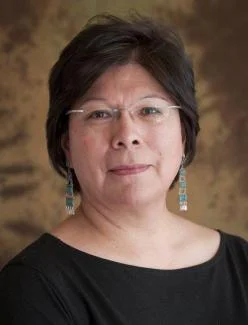
Water is life. And our oceans are precious sources of that life. As Indigenous Peoples, we have been sounding the alarm for decades, warning the world that a shift needs to happen towards a more sustainable and equitable future. It is sad and horrifying to see how greed is destroying the delicate ocean ecosystems that have sustained generations for thousands of years.
Every day Indigenous communities around the globe are impacted by climate change. We are working to adapt or mitigate climate change based on practices rooted in cultural tradition, Indigenous knowledge, and science accumulated over millennia. This work is probably the most important work being done, because it is based in understanding of spiritual relationship and responsibilities given to us as human beings. We must return to this fundamental understanding of relationship to assure the future for all of life. We simply cannot adapt and mitigate in response to climate change, yet continue our destructive behaviors. We must respect the relationships and sacred knowledge and live according to those principles.
As Dave Courchene said in reflection about the recent gathering of scientists and Indigenous knowledge keepers at Turtle Lodge, “Climate change is really about human change—a change of heart. We come forward as elders and knowledge keepers to continue to share our knowledge to provide a direction that can help us move forward to a much more sustainable Earth.”
This knowledge is deeply embedded in our worldviews and relationship with the natural world, as well as in our cultural practices. As Elizabeth James-Perry said in an interview with Cultural Survival, “Ceremony reinforces these connections. Our culture teaches us to have a healthy respect for the sea, and we have long made our homes by it and upon it, enjoying the food, mineral and plant resources, harpooning, net and hook fishing, clamming, swimming, diving, and traveling comfortably by dugout canoes to many of the places we needed or wanted to go.”
This is the knowledge that must be heard, respected, and implemented. In an article about the continuation of Indigenous activism, Roberto Múkaro Borrero writes, “In 2009, a diverse Caribbean Indigenous delegation joined other Indigenous Peoples from around the world in Anchorage, Alaska, calling upon States to work towards decreasing dependency on fossil fuels and a just transition to decentralized renewable energy economies, sources, and systems owned and controlled by local communities to achieve energy security and sovereignty.”
As I write this, COP 23 of the United Nations Framework Convention on Climate Change is finishing up in Bonn, Germany, and State governments have finally acknowledged for the first time that Indigenous Peoples can play a leadership role in climate change mitigation. A document approved in Bonn recognizes that countries “should, when taking action to address climate change, respect, promote and consider their respective obligations on the rights of Indigenous Peoples and local communities.” The document also proposes greater participation of Indigenous communities in leadership roles and mentions a need for funding. I am thankful for all the Indigenous leaders and activists who regularly attend these international meetings, pushing State governments to take notice of Indigenous Peoples’ rights, and demanding participation in all matters affecting Indigenous communities.
In Spirit,
Suzanne Benally
(Navajo and Santa Clara Tewa)
Executive Director
